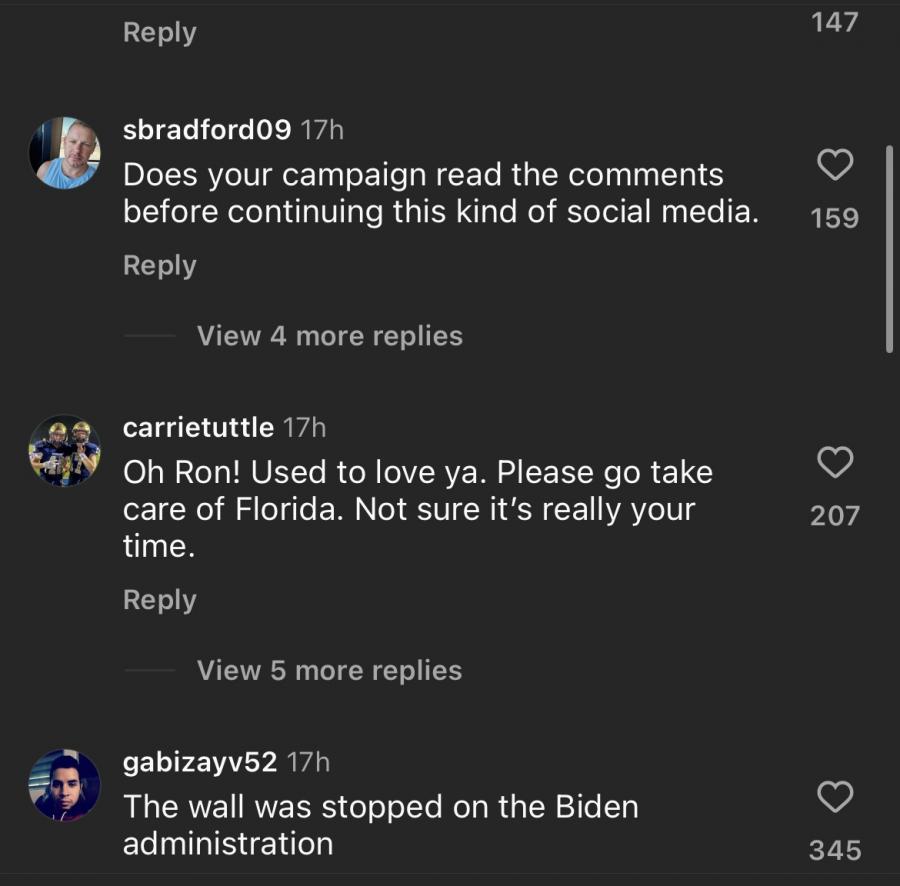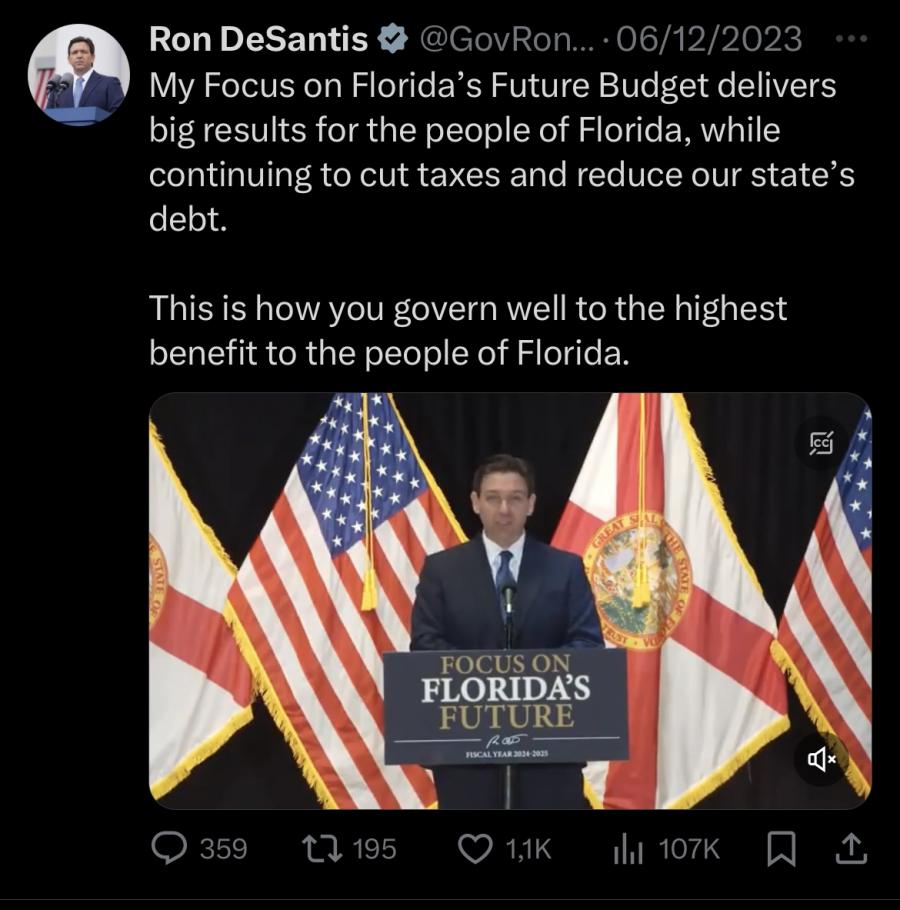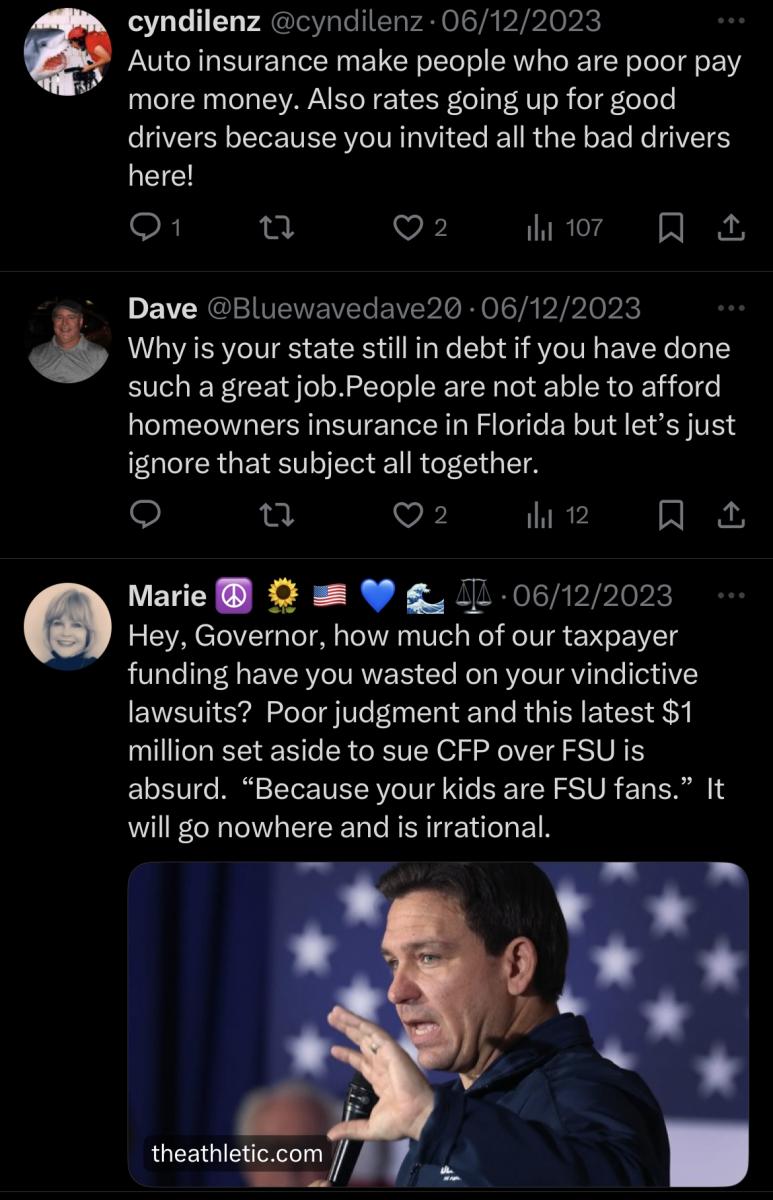
Digital Messaging and algorithmic populism in Ron DeSantis' 2024 US election campaign
Ron DeSantis is an American politician and member of the Republican Party. He was among the candidates for the 2024 Republican presidential nomination. I aim to understand this conservative-Republican politician's digital branding and algorithmic politics in this article.
Introducing Ron DeSantis
Ron DeSantis is an American politician and the governor of Florida. He was running for president of the United States of America in 2024, however, he dropped out of the presidential race on the 21st of January 2024.
The "Trumpist" DeSantis, who was running for president as opposed to Donald Trump, has had an active digital discourse via social media sites, such as Instagram and Twitter, since 2015. However, there was a growing emphasis on his digital political messaging via social media sites, such as Instagram, while running ads and campaigns for the 2018 elections- as one may judge by his Instagram activity.
Besides, the Floridian Governor, Ron DeSantis is associated with conservative political values generally. Some of his political stances are reflected within his anti-abortion, anti-wokeness, and anti-illegal immigrant discourse (Mayer & Talton, 2022) (Cabral, 2023). Furthermore, his pro-American nationalistic discourse is supported by the consequence of his serving in the U.S. Navy and his promotion of the social good of the people of Florida.
Besides, Ron DeSantis received national attention for his approach to the COVID-19 epidemic, which emphasized striking a balance between safety policies and protecting the country's economy- by which he demonstrated once again his "Trumpist '' ideologies.
Trumpist ideology refers to the radical political convictions shared by the late President Donald Trump and those who support him. It combines populism, nationalism, anti-establishment emotions, conservative principles, culture and identity politics, and unwavering personal commitment to Trump. Furthermore, this ideology prioritizes US interests, challenges the political system, and promotes conservative ideals while emphasizing topics such as immigration, inequality, and ethnicity (Lee, 2017). The governor's directives regarding COVID-19 led to opposition among leaders, such as Democrats and the public (Mayer & Talton, 2022, p.36). In the following sections, I will delve into Ron DeSantis's digital branding and algorithmic populism via Twitter.
Online Investigation
As previously mentioned, this article focuses on the digital branding of conservative Republican Ron DeSantis and how the governor uses algorithmic populism via Twitter. This following qualitative research will focus on social media communications published by the governor via Instagram and Twitter, as these are the socials with the most discourse and uptake around them, as well as these sites are used the most frequently these days when looking at political discourse (Boulianne & Larsson, 2021, p.119).
In this paper, I will refer to Ron DeSantis's digital branding as "Message". The message within American politics stands for words and an ethical portrayal of oneself intentionally structured on questions of relevance to society (Lempert & Silverstein, 2012). Besides, the Message stands even more as politicians convey their identity and personal values by selectively addressing specific issues while minimizing others.
Negatively, they may identify a competitor with substantial problems and separate themselves from them (Lempert & Silverstein, 2012, p.2). To mention an example Ron DeSantis' response to the COVID-19 pandemic in Florida exemplifies this type of political messaging. DeSantis has chosen a position that prioritizes individual liberty and limited government intrusion, which is consistent with a larger conservative ideology.
To further research the Message of the governor, I will analyze Ron DeSantis's political persona and image, such as speech behavior, body language, and appearance, as the Message has a multimodal feature (Lempert & Silverstein, 2012). Within analyzing discourse, a discursive battle of meaning will be employed when interpreting the Instagram posts regarding researching the Message of DeSantis.
Since the 21st century, political discourse has evolved, and everything has been altered, including messages, meanings and the social configurations within which they circulate (Blommaert, 2019, p1). However, not only the content of the discourse shall be analyzed when looking at discourse, but also systems of communications that establish new sociolinguistic circumstances for the output, distribution, and consumption of discourses, emerging assets, new players, and fresh interactions among actors. Besides, politicians play a minor role in shaping political discourse in the digital age. Political discourses are produced by millions of citizens, activists, and algorithms alike, and therefore, they shall not be analyzed based on their content alone (Maly, 2018).
Politics and language are closely related. "Political discourse is the use of language in ways that humans, being political animals, tend to recognize as 'political"(Chilton, 2004, p.201). Furthermore, "through verbal representation, political figures can form and perform their ideal identity. Thus, political discourse has a broader meaning, situating language as an activity, as a performative act" (Blommaert, 2005) (Konstantinova, 2023).
Therefore, to research the political identity and ideology of Ron DeSantis, I will look at it as a discursive battle of meaning. The discursive battle of meaning means normalizing one's view of society (Maly, I. personal communication, 2023). By employing the term, I aim to research DeSantis's political stance on his opposition, which helps to investigate his political persona and discourse. Furthermore, today's post-digital societies have been altered due to the digital revolution. Besides, due to digitalization, algorithms have emerged and changed everyday human practices, including our communication (Maly, 2021). As an effect of using algorithms within our daily communication lives, politicians have altered their approach to discourse and giving speeches according to digital affordances, which I will further elaborate on below in the analysis part.
Using algorithms, politicians make use of the attention economy. For a politician to gain visibility and afterward keep attention via the attention economy comes down to the "popularity" factor. The likes, followers, and comments may alter the algorithm of a social media site. However, it is worth mentioning that both platforms and users have their agency and decision-making function (Reviglio, 2020, p.17-19) (Gillespie, 2013, p,11). Besides, digital media affordances allow for consuming and producing content, creating the modern term "prosumers" (Maly, 2021). The current digital sphere is centered around input and uptake- which is the interaction around the action created by the politician.
As Ron DeSantis's digital discourse contains populism, I will employ algorithmic populism to analyze his political discourse via Twitter. A populist performs as the "voice of the people", which he achieves in our digitalized society via algorithmic populism. The importance lies in being "popular", whilst it is also essential to understand the media itself and the algorithms and features that govern post dissemination (Maly, 2018). The approach of this paper concerning algorithmic populism understands populism as a mediatized chronotopic communicative and discursive relation (Maly, 2022,p34). Therefore, the chronotopic nature of populism helps to understand populism in a specific context whilst connected to the time and place where it occurs (Blommaert, 2018) (Maly, 2022).
Ron de Santis digital message
Within the following section, I will first reflect on the Florida governor's political persona and image, such as speech behavior, body language, and appearance- based on the multimodal nature of the message (Lempert & Silverstein, 2012).
Screenshot from @rondesantis on Instagram
@rondesantis via Instagram

The Florida Governor is presented on Instagram by his social media team as a family-oriented politician supporting personal freedoms. He wears formal clothing, and whilst he stands with his family in the mentioned photo, he stays formal, his political message clear on supporting personal freedoms for the people of Florida during his governance.
Furthermore, the next Instagram communication will be analyzed based on the term Message from Lempert and Silverstein, discussed above (Lempert & Silverstein, 2012). The social media team of Ron DeSantis states via Instagram as follows: "Instead of building a wall like he promised, Donald Trump caved to the very Swamp he once denounced- trying to ram through amnesty for 2 million illegal aliens. I will finally stop the invasion and secure our border once and for all".
Screenshots from @rondesantis on Instagram
@rondesantis via Instagram


As part of his political views and conservative political discourse, Ron DeSantis opposes illegal immigration. The building of the American-Mexican border was part of Donald Trump's 2016 election campaign; however, during the governance of Democrat Joe Biden, the buildings have been placed on hold. As part of DeSantis's Message and political campaign, he placed himself as the "good character" and Donald Trump as the opposition.
Even more, he positioned himself as more "Trumpist" than Trump in this post. Donald Trump's giving amnesty to two million illegal immigrants in 2018 is in opposition to his 2016 campaign, stating, "Those days are over," which he refers to illegal immigration into the United States of America. Ron DeSantis, however, as part of his political campaign -which he ran for the 2024 United States presidential elections before dropping out placed his discourse as the one who will "secure our border once and for all", which also stands as his discourse battle of meaning. Therefore he separated himself as well as placed himself on the opposition of Donald Trump.
As mentioned above, digital media affordances allow for consuming content and producing it, creating the modern term "prosumers" (Maly, 2021). Therefore, when analyzing discourse, we have to consider the "uptake" as well. Ron DeSantis shared the Instagram discourse on the 8th of January, 2024.
Since then, it has received 3,397 likes as well as 978 reactions. The reaction under the Instagram discourse is not pleased with the campaigning of DeSantis, reading "Oh Ron! Used to love ya. Go please take care of Florida. Not sure it is your time" as well as "The wall was stopped by the Biden administration". The reactions imply that the campaign placed on Instagram may not be the most relevant next to being 'off message', since it does not reflect the "Trumpian" thoughts in the desired degree.
Algorithmic populism via Twitter
Finally, to continue to evaluate his political discourse, I will delve into how his discursive battle of meaning shapes his digital popular discourse.
The approach of this paper concerning algorithmic populism understands populism as a mediatized chronotopic communicative and discursive relation (Maly, 2022,p34). As populism is placed in a particular context, I will analyze how Ron DeSantis articulates his populist discourse on Twitter below, such as prioritizing the needs of the people of Florida and promising to create favorable situations for them. Besides assessing the input of the Twitter communication, I will elaborate on the reactions around it and the uptake.
Screenshot via Twitter (X) created by @rondesantis
@rondesantis via Twitter

Within the presented Twitter communication produced by his media team, Ron DeSantis's populist discourse is reflected in his ideas about a favorable political and economic future for the people of Florida. Stating "big results for the people of Florida'', he steps up as the "hero" of Florida, promising the people of Florida lower taxes whilst reducing the state's debts, which is an act that may lead to being considered popular as the wishes of the people may be heard by the Governor- who is taking action to "highest benefit the people of Florida".
To analyse the populist nature of the mentioned Twitter communication, we shall look at the "thin ideology", which refers to the people versus elite frame by which populism can be defined. According to Margaret Canovan and others, society consists of two groups: the "pure people" versus the "corrupt elite".
In line with this viewpoint, politics shall be constructed from the general will of the people (Canovan, 2002), (Maly, 2022, p.36). Therefore, in this context, DeSantis constructs his popular political discourse by placing high importance on the needs of the people of Florida. Whilst the Florida governor practices a populist discourse, he also enhances the act of making promises within his discourse.
"Regardless of the reasons for making a promise or breaking it, promising is believed to be a social reality which lies within accepted public manners and is explained in terms of institutional rules" (Abbas, 2015,p.332).
Promising is furthermore considered to serve a purpose in society, and people engage with it as a fact of life. As a result, promising serves the purpose of altering the interpersonal environment: it serves to persuade another of the speaker's good intentions, to soothe the recipient's irritability, to provide others with happiness and delight, and to communicate a person's acceptance or disapproval.
"Within a field-theoretic perspective, politics is ultimately a relational contest over
control of material and symbolic resources, including the ability to define the
rules of the political field itself" (Bourdieu 1994) (Bonikowski & Gidron, 2016, p.1597).
Narratives regarding ethics, like those concerning financiers' avarice or lawmakers' bribery, can be incredibly successful in boosting people's perceptions of dignity through comparison between groups. To understand popular claims-making, it is essential to consider contextual variables such as execution, location, target demographic, political and economic circumstances, and system of incentives in the study area (p. 1599).
Algorithmic populism concerns how digitization has changed many areas of modern society, including politics. Discourse via social media as an uptake responding to political discourse serves as a way of constructing the 'voice of the people'- referring to algorithmic activism, which serves as a response to political discourse. These mentioned activists give their input and influence algorithmics by reacting positively or negatively to political discourse on the internet (Maly, 2018). Therefore, as mentioned above, populist discourse cannot depend solely on the input but also vastly depends on the uptake and the reaction it receives.
Concerning the uptake of the Twitter communication, it was placed on Twitter on the 6th of December, 2023. Whilst gaining hundreds of comments and re-tweets, it has been viewed by a hundred-and-seven-thousand individuals. However, the commentators had opposing views on the Governor's future economic plans for the state, as we can see below:
Screenshots via Twitter (X) by @rondesantis


The shared "tweet" from the Ron DeSantis social media team has received a significant uptake and attention, as well as both optimistic and critical reactions. Among the vastly critical reactions were positive comments, such as a comment by "Burt Macklin", a fictional character of an actor playing an FBI agent. Whilst he is a fictitious character, he has an audience group of almost six thousand followers.
Therefore, by having commentators underneath Ron DeSantis' Twitter communication, he generates the algorithm in his favour, as he receives more attention from it. The view above is algorithmic activism, which means that commentators interact within the algorithm, contributing to the spread of the politician's message (Maly, 2018).
Summing up
Digitization has led to the use of algorithms within all sectors of life, including politics. Algorithms and the use of social media have altered the traditionality of politics. It has also led to the altered nature of political speeches, as the input from the politician’s side is not solely enough to construct a populist discourse. As much as the input, the uptake holds equal importance within algorithmic politics.
The ‘voice of the people’ reactions underneath digital discourse shape the dynamics of populism of a Twitter post, to mention an example, and it is a crucial part of a politician receiving attention around their issue or campaign. This paper discusses the political discourse of Florida Governor Ron DeSantis by analyzing his Message and Algorithmic populism.
As a conservative Republican politician, DeSantis stands up for the conservative values represented in his discourse. Besides, DeSantis used his political campaign to reflect values about personal freedoms, family and the good of the people of Florida, forming his populist discourse.
References
Abbas, N. (2015). Promising in American Presidential Discourse. International Journal of English and Education, 4(4), 332.
Bonikowski, B., & Gidron, N. (2016). The Populist Style in American Politics: Presidential Campaign Discourse, 1952–1996. American Journal of Sociology, 121(5), 1597–1599.
Boulianne, S. (2023). Engagement with candidate posts on Twitter, Instagram, and Facebook during the 2019 election. New Media & Society. Advanced online publication.
Blommaert, J. (2019). Political Discourse in Post-Digital Societies. Journal of Language and Politics, 18(1), 1.
Cabral, S. (2023). Where Ron DeSantis Stands on Key Issues.
Chilton, P. (2004). Political animals as articulate mammals. In M. Wetherell, S. Taylor, & S. J. Yates (Eds.), Discourse Theory and Practice: A Reader (pp. 1–16). Routledge.
Gillespie, T. (2013). The Relevance of Algorithms. Media Technologies: Essays on Communication, Materiality, and Society, 167–194.
Konstantinova, I. (2023). The Political Message of Revival’s Leader Kostadin Kostadinov. Journal of Politics and Society, 33(1), 55–70.
Lee, M. J. (2017). Considering Political Identity: Conservatives, Republicans, and Donald Trump. Rhetoric and Public Affairs, 20(4), 719–730.
Lempert, M. (2012). "Message" Is the Medium. In M. Silverstein (Ed.), Creatures of Politics (pp. 1–18). Indiana University Press.
Maly, I. (2021). Ideology and algorithms. Ideology Theory Practice, 3(2), 117–130.
Mayer, M., & Talton, W. (2022). Heir to the Throne: Ron DeSantis’s Inheritance of a Trumpian COVID-19 Ideology. International Journal of Critical Cultural Studies, 20(3), 36.